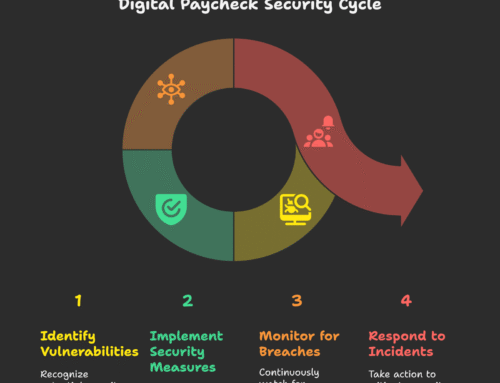Highlighting earnings and deductions, as well as paystubs, fosters transparency and trust between employers and employees. When employees see exactly how their pay is calculated, it leads to greater satisfaction and less room for misunderstandings.
Paystubs play a key role in compliance with labor laws. By providing a detailed record of wages and deductions, they help both employers and employees meet legal requirements. Mistakes can be costly, so maintaining accurate records is important. This is where the ability to create paystub in minutes becomes a valuable tool for companies.
In addition to compliance and transparency, access to clear paystubs can even boost morale. When employees understand their paycheck details, it leads to increased satisfaction and trust. This simple document helps build positive relationships in the workplace, making it an important part of HR management.
Image by rawpixel.com on Freepik
The Role of Paystubs in HR Management
Paystubs are important tools in HR management because they help with legal compliance, increase financial clarity, and make the payroll process smoother. Exploring these areas illustrates their significance in maintaining a well-functioning HR system.
Ensuring Legal Compliance
Paystubs are necessary to keep up with labor laws and tax regulations. They provide a detailed breakdown of wages, taxes, and deductions. This documentation is necessary for legal purposes, as it helps to prove that an employer has met all payment obligations.
By keeping clear and accurate paystubs, employers can avoid disputes about wages or working hours. It helps in demonstrating adherence to rules that require specific information to be disclosed in employee payments. This practice not only protects the employer from legal troubles but also provides employees with the assurance that their rights are being respected.
Facilitating Financial Transparency
Paystubs offer employees a clear view of their wages, deductions, and net pay. Employees can understand how their taxes, insurance, or other deductions impact their take-home amount. This transparency helps build trust between the workforce and the employer, as employees feel informed about their earnings. In fact, a survey by Harvard Business Review found that 58% of employees trust their company more when pay transparency practices are in place .
A detailed paystub can also assist in addressing any discrepancies in payment. It serves as a record that can be used to verify the payment process and resolve any differences quickly. Transparency in financial matters boosts workplace morale and contributes positively to the organizational environment.
Streamlining Payroll Processes
The use of paystubs can simplify the payroll process by providing a consistent method for documenting payments. By using standardized paystubs, companies can reduce errors commonly associated with manual calculations or data entry mistakes. This approach saves time and resources that can be redirected to other HR tasks, so digital paystubs are becoming popular for streamlining payroll operations. “By 2023, 85% of businesses had switched to digital paystubs, which reduced payroll errors by up to 82%, according to the American Payroll Association, improving efficiency and minimizing disputes”.
Paystubs play a significant role in contributing to employee well-being. They support satisfaction by providing clear and detailed financial records, building trust through transparency, and helping employees manage their personal finances effectively.
Improving Employee Satisfaction
When employees receive paystubs, they gain access to a detailed financial record of their earnings, deductions, and taxes. This transparency helps them understand exactly what they are paid for each period. It reduces confusion and improves confidence in their compensation.
A clear picture of earnings supports employees in making informed financial decisions. They can plan for future expenses or savings based on a reliable record of their income. This level of clarity contributes positively to their satisfaction with the company and its financial practices.
Having a record of payment helps employees resolve any pay-related discrepancies quickly. This contributes to a more satisfying work experience by guaranteeing they feel understood and valued by their employers.
Building Trust Within the Workplace
Trust between employees and management is strengthened when payment details are transparent. This transparency reduces any potential misunderstandings related to pay and contributes to a fair workplace environment.
A clear and honest financial record encourages employees to trust the company’s commitment to fair treatment. They feel more appreciated and respected when their income is handled with transparency and accuracy.
Employers who provide consistent and accurate pay records demonstrate reliability. This can lead to improved morale among employees, who feel that their hard work is being rewarded accurately and fairly.
Supporting Personal Financial Management
Paystubs are an important tool for managing personal finances. They provide a summary of earnings, deductions, and net pay that helps employees budget effectively. This information allows them to plan for expenses such as bills, groceries, and leisure activities.
With a record of deductions and withholdings, employees can better understand their tax obligations. This helps reduce stress related to tax preparation and filing, making financial planning easier and more efficient.
Access to detailed financial information encourages employees to save or invest wisely. By understanding their financial position clearly, they can make informed choices about how to allocate their resources. This contributes to greater financial stability and peace of mind.
Conclusion
Paystubs serve as key tools in HR management by promoting financial clarity and employee trust. They provide detailed information on earnings, deductions, and benefits, benefiting both employers and employees.
Moving towards digital paystubs can improve record-keeping and compliance, improving employee satisfaction. It streamlines processes and supports transparency for everyone involved.
In embracing digital solutions, companies align with modern workforce expectations, paving the way for smoother HR operations.







Leave A Comment